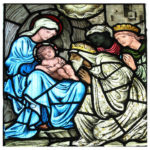We run our website the way we wished the whole internet worked: we provide high quality original content with no ads. We are funded solely by your direct support. Please consider supporting this project.

Are the Gospels Historical Fiction?
Some scholars today argue that the stories recorded in the Gospels are actually intentional fabrication. In essence, they argue that Mark took Paul’s theology and robed the story of Jesus in a fictitious historical narrative. The other Gospels followed suit. The argument is clever and removes the difficulty of explaining how a legend of a God-man could arise so quickly among first-century Jews.
But there are 7 major problems with this contention:
- The Gospels don’t read like a fictional genre of literature. To the contrary, they give us many indications that they genuinely intended to report reliable history. In addition, they pass all the standard tests scholars usually apply to ancient documents to ascertain a general historical reliability.
- We must ask why the authors of the Gospels would want to create a new, fictionalized Jesus story. What was their motivation? By the time that these authors were writing the Gospels, Christians were being tortured and put to death for their faith. So what could these authors have thought they or their readers would gain by fabricating and embracing this fictional story?
- We have to wonder why any early Christian would have accepted them as true.
- How did the authors of the Gospels think they could get away with creating a fiction situated in the recent past and in such close geographical proximity to their audiences? We must remember that Jewish religious authorities had a vested interest in putting an end to this movement, which they considered to be a dangerous sect. If the story these authors were telling was false, it seems it would have been relatively easy to expose it as such.
- To accept the version of the early church history offered by these scholars, we must also accept that the version of the church history given in the book of Acts is largely false. For many reasons that cannot be addressed here, the book of Acts is a remarkably reliable piece of ancient historiography.
- An understanding of the Gospels as fictitious completely ignores the role that writing plays in orally-dominant cultures. Writing was not the primary means of communication among people in the first century. Rather, information was passed along primarily by word of mouth. Writing plays a very different role in these cultures than in “literary cultures.” In literary cultures, novelty and innovation in literature is valued. In orally-dominant cultures, it is generally frowned upon. The primary purpose of writing, rather, is faithfully to re-express an established oral tradition.
- Research has demonstrated that in orally-dominant contexts people tend to be quite resistant to change in terms of the essential components. Oral performers—those who regularly recite oral traditions for their communities—are allowed a certain amount of flexibility in how they recite traditional material. But if the oral performer alters anything of substance in the tradition, members of the community customarily interrupt and correct him or her. Hence, the suggestion that a fictional writing from an anonymous author could have overturned established oral traditions about Jesus in the early church must be judged as massively improbable. This is simply not how orally-dominant cultures tend to operate.
—Adapted from Lord or Legend? pages 42-45
Image by Walters Art Museum Illuminated Manuscripts via Flickr
Category: Q&A
Tags: Bible, Biblical Criticism, Gospels, Jesus, Lord or Legend?
Topics: Biblical Reliability, Jesus: Lord or Legend
Related Reading

How the Bible is Trustworthy
All of God’s communication in the Scriptures are covenantal in nature. Expressing his covenantal love and faithfulness, God stoops to “breath” Scripture as a means of bearing witness to his covenant relationship with Israel, and then with the Church. Ultimately God “breathed” (2 Tim 3:16) the Scriptures in order to bear witness to the One…

The Cross in the Manger
There has been a strand within the Western theological tradition—one that is especially prevalent in contemporary American Evangelicalism—that construes the significance of the cross in strictly soteriological terms. The cross is central, in this view, but only in the sense that the reason Jesus came to earth was to pay the price for our sin…

Is the Jesus of Revelation Wrathful?
In the second coming of Jesus, will he turn with wrath? Will he come as a roaring lion, ready to put on his display all of his anger, power, and might? What does the Jesus revealed in Revelation look like? This is a short clip that addresses these questions. If you want to watch the…

Did God use Satan to test Job?
Question: In Job 1:21 and 2:10, Job seems to accept “adversity” from God while continuing to trust him. Job blames his troubles on God (i.e. “He shattered me” [16:12], “He breaks me down on every side” [19:10], “For he performs what is appointed for me” [23:14]). In Chapters 1 and 2, God even seems to…

The Greatest Love Story Ever Told
This is the first week of Advent, the season where we anticipate the coming of Christ. It’s a time to hear and enter into the story of how Jesus came out of love to give his life for us. This grand love story of Christmas taps into a deep intuition we have about the centrality…

Does the Doctrine of the Trinity Matter?
Jesus reveals the greatest, most beautiful, and mysterious aspect of God when he, despite being himself God Incarnate, relates to God as his “Father” and refers to God as “the Holy Spirit.” There is, of course, only one God (1 Cor 8:6). Yet Jesus reveals that God somehow exists as Father, Son and Holy Spirit.…
